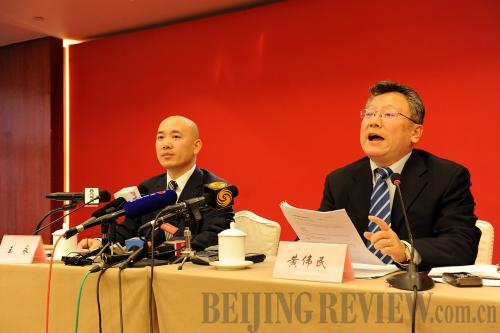|
 |
|
CLEARING THINGS UP: Wang Yong (left), spokesman for the newly established supervisory committee of the Red Cross Society of China (RCSC), and Huang Weimin, secretary general of the committee, announce results of a probe concerning the RCSC's alleged misconduct at a press conference in Beijing on January 4 (HE JUNCHANG) |
Transparency, especially disclosure of financial information is vital for charities to win donors' trust, said Zhong Hongwu, Director of CASS' Corporate Social Responsibility Research Institute.
An overwhelming majority of the public is dissatisfied with the transparency of charitable organizations. In 2011, 92 percent of people surveyed by the China Charity and Donation Information Center said that they were dissatisfied with the amount of information disclosed by charities in the country.
On January 5, 2013, the China Charity and Donation Information Center published the 2012 China Charity Transparency Report, which revealed that 61 percent of the public were unsatisfied with the transparency level of charities.
Reform initiatives
The Guo Meimei scandal is a reminder that charities need reform, said Yang Tuan, Deputy Director of the Social Policy Research Center of the CASS.
In October 2011, the RCSC named Zhao Baige its new executive vice president to oversee the organization's daily operations. Zhao, then 59, has a doctoral degree in biomedical science from Cambridge University, and had served as the deputy head of the National Population and Family Planning Commission before joining the RCSC.
In November 2011, Zhao invited more than 20 scholars from prestigious think tanks and universities to explore RCSC's reform strategy, and Yang was one of the researchers invited.
The researchers' proposals were included in a document on promoting the development of Red Cross activities issued by the State Council on July 10, 2012.
It was suggested that the RCSC should reform its internal governance structure by tightening control over its local branches, as well as open itself to public supervision.
In 2012, the RCSC also invited the International Federation of Red Cross and Red Crescent Societies to diagnose its problems. Zhao said that the international organization identified four relatively big problems, including a poor internal governance structure, low work efficiency, weakness in volunteer management and insufficient advocacy.
On July 31, 2012, the disclosure system was given a trial run online. Since then, donors who have contributed to relief efforts for the earthquake that hit Yushu Tibetan Autonomous Prefecture in northwest China's Qinghai Province in April 2010 can verify their donations at the RCSC's website.
In August 2012, Zhao said that the RCSC was working to increase transparency in the process of collecting and utilizing donations, and provided a timetable for the project. She pledged that donation information of 80 percent of the provincial Red Cross organizations would be available online by the end of 2013, and donation information of 80 percent of prefectural-level and more than 50 percent of county-level Red Cross organizations would be accessible online by the end of 2014.
On December 10, 2012, the RCSC held a press conference announcing the establishment of its supervisory committee.
Zhao promised to facilitate the work of the committee, guarantee its access to information and its right of participation and supervision.
Observers questioned its status as an independent oversight body. Its spokesperson Wang said that members of the committee do not get any remuneration from the RCSC, which only reimburses members for the cost incurred while performing their supervising duties.
Under the current framework, the role of the supervisory committee might be restrained because it is empowered and financed by the RCSC, said Deng Guosheng, Director of the Center for Innovation and Social Responsibility in the School of Public Administration of Tsinghua University. Deng is also a member of the supervisory committee.
Wang Rupeng, Secretary General of the RCSC, said that the supervisory committee is only one part of the oversight system, and the RCSC will also be supervised by other parties, including the government.
Resistance to reform is strong, particularly internal resistance to efforts in stopping the RCSC from being run as a government bureau, said Yang. She said that currently, employees in the RCSC and local affiliates enjoy similar status as civil servants; reform threatens such entrenched privilege.
In her 2013 New Year message, Zhao said that in the past year, the RCSC carried out reform initiatives such as openly recruiting external audit agencies and strengthening supervision over Red Cross hospitals. She said the RCSC will make itself open, transparent and trustworthy.
Email us at: wanghairong@bjreview.com | 